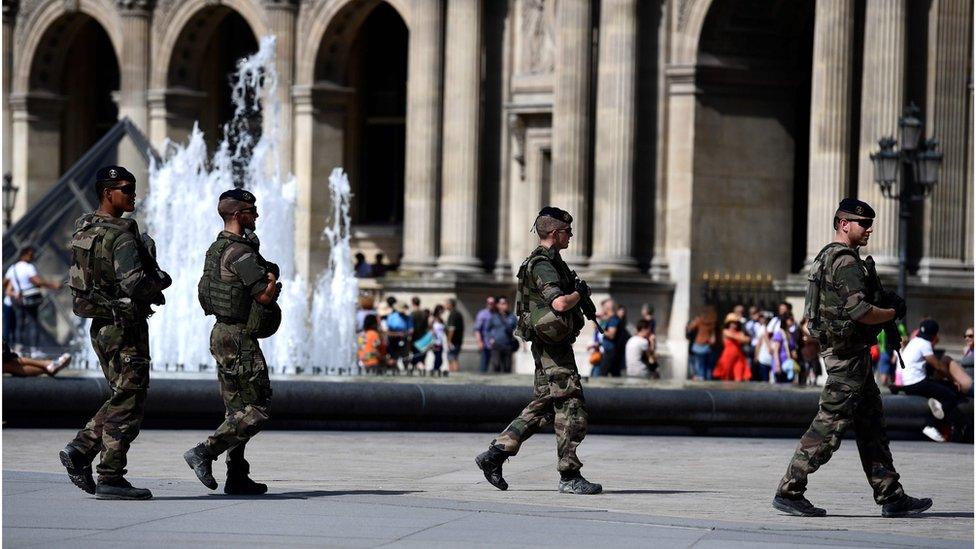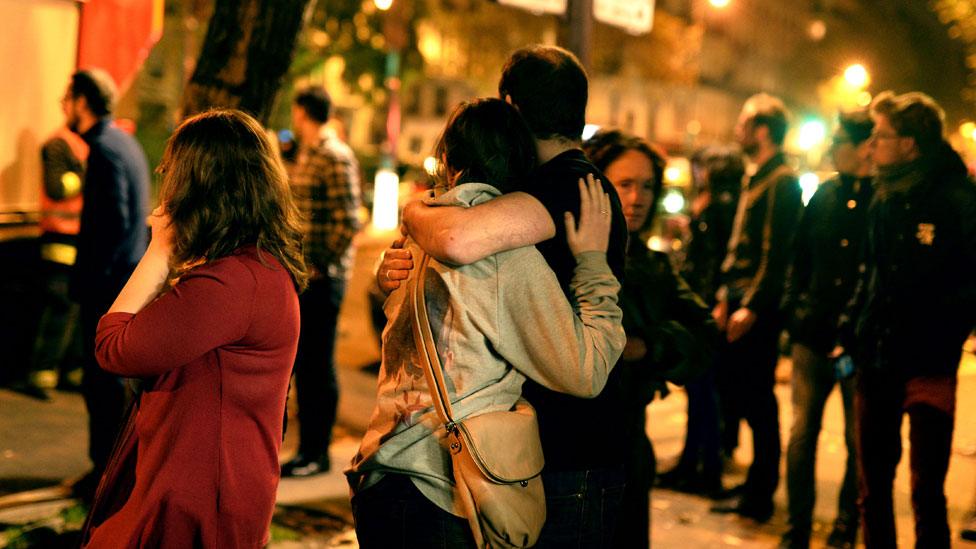Notre-Dame plot: Five women in court over foiled car bomb attack
- Published

A court sketch during the trial on Monday of women accused of plotting a bomb attack in Paris
Five French women have gone on trial in Paris accused of trying to detonate a car bomb near the iconic Notre-Dame cathedral in September 2016.
Six gas canisters in the vehicle, which had been doused in diesel fuel, failed to explode when a cigarette was thrown at them, prosecutors said.
One of the women is accused of stabbing an officer in the shoulder after police traced them to a nearby apartment.
A defence lawyer said the women had been brainwashed on the internet.
The defendants, now aged between 22 and 42, are all Muslim converts.
They have been named as Inès Madani, Ornella Gilligmann, Sarah Hervouët, Amel Sakaou and Samia Chalel. All of the women face terrorism charges, and four of them face life imprisonment.
What have police said about the bomb plot?
On 4 September 2016, police were alerted to an abandoned grey Peugeot 607 vehicle parked near the cathedral in one of Paris's busiest tourist locations.
The car's licence plates had been removed and its hazard lights were flashing.
It was found to contain five gas canisters, three jerry cans of diesel and a half-smoked cigarette. Some of the diesel fuel was used to douse the contents of the vehicle, but had failed to ignite from the cigarette, police said.
The discovery prompted an urgent police search.
The car was found to belong to Ms Madani's father and, according to court documents, fingerprint evidence was collected from inside.
Investigators said the bomb attempt would likely have been successful had it not been for "the wrong choice of fuel".
What are the allegations?
Based on the evidence collected, police launched a raid at a property on the outskirts of Paris.
During the raid, Ms Hervouët reportedly stabbed an officer with a knife, and Ms Madani was shot in the leg while charging at another.
Police said they had found a handwritten pledge of allegiance to Islamic State (IS) leader Abu Bakr al-Baghdadi inside Ms Madani's purse.
The women are all suspected of planning the bomb attack on the instructions of Rashid Kassim, a so-called handler for IS, who was based in Syria at the time.
Kassim, who is also named as a defendant and accused of directing the women "remotely", will be tried in absentia - he is thought to have been killed in a drone strike in Iraq in February 2017.
The women are believed to have been planning other attacks at the time, including striking a train station in the Paris area and targeting police.
The trial is expected to continue until 11 October.
France has suffered a series of attacks by jihadists who have declared allegiance to IS in recent years.
In November 2015, 130 people were killed and many more were injured in the co-ordinated suicide bombing and mass shootings around Paris.
How the November 2015 Paris attacks unfolded across the city
On 14 July 2016, dozens of people were killed, including children, when a lorry ploughed into a large crowd watching a fireworks display in Nice, southern France, to mark the Bastille Day holiday.
- Published13 September 2016

- Published6 November 2018

- Published9 December 2015
